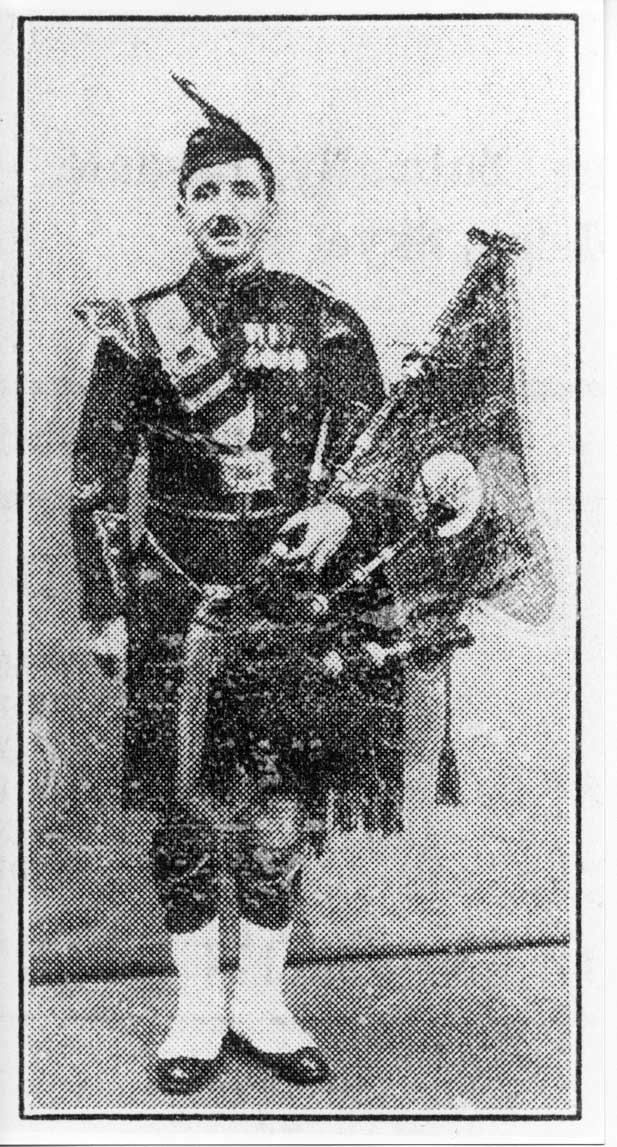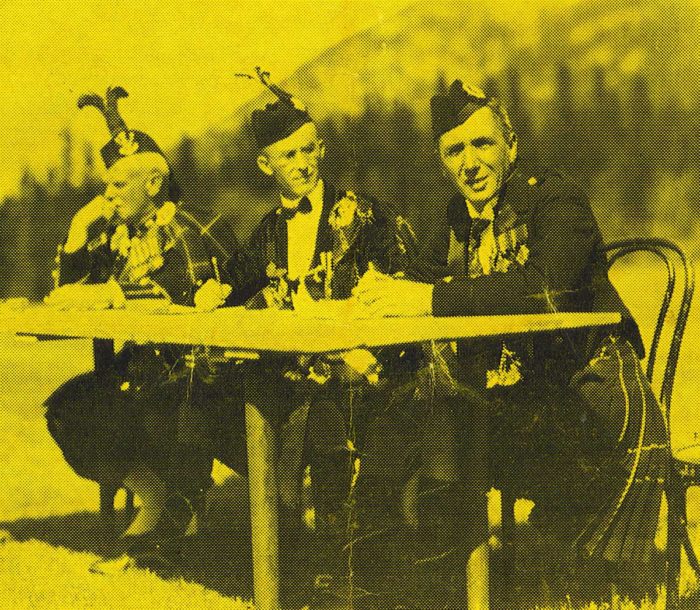William Fergusson
(1885-1949)
 William Fergusson was born in Arbroath in 1885 and died in Glasgow in 1949. Composer of such march standards as “The Australian Ladies,” “The Atholl and Breadalbane Gathering,” and “Kintara to El Arish,” as well as the strathspey “Dornie Ferry,” he learned piping in the 102nd Boys Brigade under ‘P/M Hutchins,’ and was then taught by 7th Battalion H.L.I. Pipe Major Farquhar MacRae, a pupil of Sandy Cameron. He would succeed MacRae as pipe major in 1914, though before this he was divisional pipe major of the 52nd Lowland Division. Most of his great tunes were written during the war years.
William Fergusson was born in Arbroath in 1885 and died in Glasgow in 1949. Composer of such march standards as “The Australian Ladies,” “The Atholl and Breadalbane Gathering,” and “Kintara to El Arish,” as well as the strathspey “Dornie Ferry,” he learned piping in the 102nd Boys Brigade under ‘P/M Hutchins,’ and was then taught by 7th Battalion H.L.I. Pipe Major Farquhar MacRae, a pupil of Sandy Cameron. He would succeed MacRae as pipe major in 1914, though before this he was divisional pipe major of the 52nd Lowland Division. Most of his great tunes were written during the war years.
After the war he became pipe major of the City of Glasgow Pipe Band, which became the legendary Clan MacRae Pipe Band. In this position he became one of the first of the modern era’s great prize-winning pipe majors, leading the Clan MacRae to World Championships in 1921, 1922, 1923 and 1925 and unrivalled success throughout the 1920s. The band was a prize-winning machine, and on the day of one of their Cowal wins, Sir Harry Lauder was heard to exclaim, “You would actually think it was one set of pipes and a drum that was playing!”
Fergusson left the band in 1929 on the eve of his first tour of Canada. Hamish MacColl succeeded him as piper major. MacColl had been tutored by Fergusson and had been a member of the band since 1907.

Fergusson would tour Canada again in 1931. In 1940 he published Fergusson’s Bagpipe Melodies, which contained tunes and arrangements by himself and others. Known by many as “Fergie,” he was an enthusiastic member of the Scottish Pipers’ Association during his latter years.
Of Fergusson’s accomplishments in the evolving role of competitive pipe major, Dr. William Donaldson writes in The Highland Pipe and Scottish Society:
The career of William Fergusson is a reminder of how vital and diverse the pipe band movement was to become in the inter-war period. Here after all was a new pathway to eminence, as pipe-major of the new-style, technically virtuosic civilian band – the exact equivalent in ensemble terms of the top-flight solo performer, at its best a walking marvel of problem solving – operating in a dynamically expanding competitive environment. It was a demanding role, combining great technical expertise with high-level managerial, interpersonal and training skills, and many fine players were attracted by its challenges, preferring its highly charged and gregarious atmosphere to the discipline isolation of a solo career.
When he died in 1949 his fame was such that it warranted an appreciation in the Oban Times written by the great Robert Reid.
JM, April 2007
-with notes from ‘The Highland Pipe and Scottish Society’ by Dr. William Donaldson, 2000, ‘The Piper in Peace and War’ by C. A. Malcolm, 1927, Piping Times “Notices of Pipers,” October 1968, and the ‘Oban Times’ through private communication with Dr. Donaldson.
